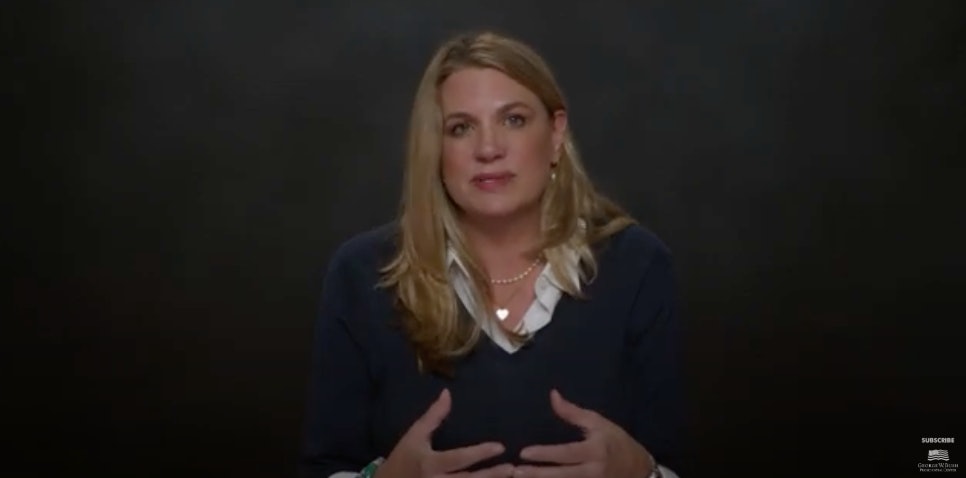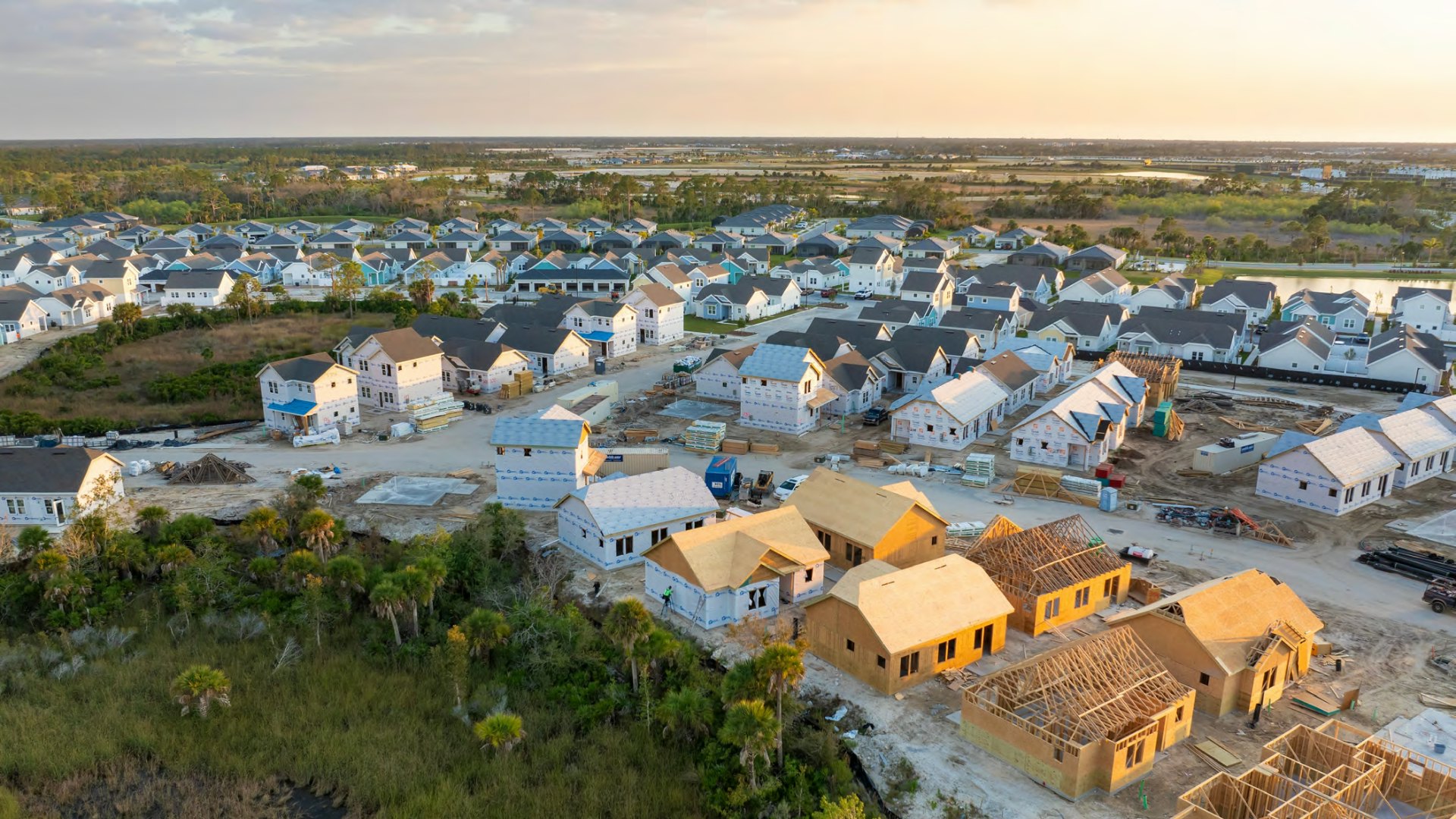In mid-April, Holly Kuzmich, George W. Bush Institute Executive Director, sat down with Dr. Condoleezza Rice, former Secretary of State, to discuss immigration.
As part of a series on immigration insights, Dr. Condoleezza Rice shares her perspective about the current state of the southern border and the root causes of the migrant increase. In the interview, Dr. Rice states that immigration is “America’s secret weapon.” A full transcript of the conversation can be found below.
Transcript
Holly Kuzmich: Today, I am thrilled to be joined by a guest that does not need an introduction. She is a good friend of the Bush Center, former United States Secretary of State Condoleezza Rice. Condoleezza, thanks for being here.
Condoleezza Rice: It’s great to be with you. Thanks very much for having me.
Holly Kuzmich: So, we’re going to talk about immigration. Of course, we are doing a lot at the Bush Institute to advance this issue. It’s an issue that is long overdue for reform in terms of our system. And I want to talk to you particularly about all of the recent issues we’ve been seeing at the Southern border. A lot of us are looking at these root causes. Why are people leaving Central America? What’s causing them to flee the Northern Triangle countries of El Salvador, Guatemala, and Honduras? As a diplomat and the former Secretary of State, I’d love for you to talk about what we, the United States, can do to help mitigate some of those root causes in the region.
Condoleezza Rice: Well, I think we’re right to think about root causes because as long as people are in danger, as long as their children are in danger, they’re going to try to find a way to leave. And the Northern Triangle has been a dangerous place for some time now. Gang warfare, police and militaries and paramilitary organizations are really outgunned by the gangs that essentially control the streets. And if you are a parent, you see these really sad pictures of these unaccompanied minors coming across the border and it just says the desperation of parents to get their children out of these very dangerous situations. And so we are going to have to address root causes, and I think we know how to do it. It takes time. We have the experience of Colombia, which when President Bush took office in 2001, Colombia was a failed state. The police could not control 30% of the country because of the very well organized spark.
Now, it well may be that these gangs are somewhat less dangerous in the sense that they are really paramilitary organizations in the same way. But what it took was leaders like Uribe in Colombia who were willing to take them on. It took U.S. assistance, U.S. intelligence assistance, U.S. military assistance, U.S. training assistance, and really support for that country to take its streets back. And so I think something like that is going to have to be done in the Northern Triangle, but Holly, it’s going to take time and we’re talking about a decade, not shorter in controlling this problem.
Holly Kuzmich: Talk a little bit about the American values that we think should shape our approach to border security. I mean, there’s these tensions between enforcement, but then the understanding that these are human beings and they’re coming from really disparate circumstances. So how do you think about the values that should be part of our leadership on these issues?
Condoleezza Rice: Well, no country can exist for very long if they can’t control its border. And so I’m very much sympathetic with those who say that we have to have border enforcement. People have to enforce our laws. I think we have to be careful not to give the impression that if people get to the United States, that they’re going to stay. That causes the kind of a flood of people that I think we’re seeing right now. But on the other hand, can you really turn back a 13 year old or a 10 year old, or even a mother and a child who have crossed that border in the most desperate circumstances? And so in addition to enforcement and we need better enforcement, we really do and in addition to the root causes that we’ve just talked about, we really are going to have to do a better job of bringing these people into a place that they can be taken care of.
I certainly hope there is COVID testing going on because we don’t want to release people into the general population. And I feel that these border towns are really kind of overwhelmed. You’re here in Texas. You know how hard it is on these border towns. The federal government has just got to do a better job of dealing with what is really a crisis, whatever it takes in terms of resources, whatever it takes in terms of personnel to deal with this situation while we take care of the root causes and while we take care of, I think, messages that were sent that people heard and you know too, and President Bush has talked about the fact that it’s not even the citizens of these countries that hear the messages. The coyotes, the people who profit from just dropping these people at the border and fleeing. Those are the ones who say, “Well, the president of the United States just said you can just come,” and people believe it. And so there’s a messaging issue. There’s a taking care of people at the border issue. There’s a border control issue and there’s a long-term issue of root causes. And we have to deal with all of them.
Holly Kuzmich: How do you think about… The countries in the Northern Triangle have significant corruption. Rule of law is a real challenge. So what tools do we have to help, from the United States perspective, to think about how we engage with these countries? A lot of people are skeptical saying they have corrupt governments. What can we do from our side when there’s a corrupt government there? How should we approach that?
Condoleezza Rice: Yes. Well, they vary in terms of corruption. Let’s say some corruption in all of them. They vary, but Guatemala is better governed and maybe you start there. One of the things we tried to do with foreign assistance was to help those who were trying to help themselves. And so maybe you start with Guatemala and you try to help them strengthen their police forces, strengthen their judiciary, go after these gangs and go after those who are exploiting the weak and exploiting the citizens. But you have to deal with what you’ve got. We don’t have the ability to bring governments that we think are more capable, but we can say, “If you want to be more capable, we will help you to get there.”
I think the other thing is we have to engage others within Latin America. There’s a lot of talk about what Mexico needs to do and obviously Mexico needs to do more. I actually think the idea that people might be processed from Mexico is not a crazy idea. And if people know that they’re going to have to stay in Mexico to be processed, that might stop some of the flow, but this is a problem for countries of Latin America more broadly. And so trying to engage countries that do work– Colombia for instance… Peru– and say, this isn’t just an American problem. You have an obligation also to help. The organization of American states– the grouping of all of the Latin American countries– has frankly never been terribly good at operations, but you do need to get to some of the supports. It’s not just the United States and not just Mexico, but recognizes it is after all Central America, meaning that there’s a southern and a northern problem here.
Holly Kuzmich: Right. Right. So you’ve long been a champion for immigration reform. Obviously, President Bush tried very hard in his second term especially to really get this across the finish line. President Obama tried. There was an effort back in 2013. President Biden has made this a priority, although there are lots of things he’s got to deal with these days. What sort of general framing and advice would you have for policy makers to say, think about immigration reform and how to get enough support behind it to make some progress?
Condoleezza Rice: When you look at immigration reform, you have to take it from the perspective that people come at the immigration problem with different sets of interests and different sensibilities. And what you have to try to do is construct a policy that takes all of those into consideration. So there are the border control and border enforcement people. They have to be a part of any immigration reform. You can’t just say, “Well, we’re not going to talk to those people who care about borders.” You have to deal with the people who know that we’ve got 10, 11, 12 million people living in the shadows, including the DACA kids who through no fault of their own were brought to the United States as children. And so you have to say, “What are we going to do about the people who are already here,” and we’re not the kind of country that’s going to deport people who are already here.
These are people who no longer have a country to go back to. And so what are you going to do about those people? And then you have to deal with the very thorny question of a path to citizenship. What does it mean? And I thought that one of the things that the bill that President Bush along with the late Senator Ted Kennedy and Senator Kyle of Arizona, late Senator McCain, one of the things that was great about the bill that they were proposing was that it took the concept that there were people who were here who were working, who had jobs, who were trying to really make their way here and said, “All right, you’re going to pay a fine for having come illegally, but we don’t want you to be permanently in that never, never land where you could never be a citizen.”
And so I think any good immigration reform is going to have to deal with all of those problems. One other element, we know the problem on the border now and the Northern Triangle and so we tend to think of about the immigration problem as one that’s a low status problem. But in fact, we need immigration also at the level of those knowledge workers who we still need to bring in. One of the things that the United States of America has done better than any country in the world is make it possible for some of the world’s most vibrant, smartest, innovative people to come here and be American. If you just look at Silicon Valley where I live or Austin, Texas, you will see that the founders of these startups, a lot of these very innovative people have come from other places because America was the land of opportunity.
And so when we talk about immigration, I think it’s really important to recognize that what we’re looking for in immigrants is people who are willing to take the risk to leave places that they have known, sometimes to leave family behind. They want to take advantage of the fact that in America, it doesn’t matter where you came from. It matters where you’re going. And we need to make certain that we’re continuing to regenerate ourselves and make ourselves more vibrant by bringing those immigrants here because maybe they understand the American dream better than a lot of people who were born here and take it for granted.
Holly Kuzmich: That’s an important point. I mean, immigrants strengthen our global competitiveness– and you saw this I’m sure as you traveled the world. And still do, somewhat restrained, especially with COVID. But talk a little bit about how it strengthens our position as a competitor on the economic front.
Condoleezza Rice: I remember sitting next to the Singaporean father in a sense, Lee Kuan Yew, at a dinner when I was national security advisor. And he said to me, “Do you know why America is always going to win, it’s always going to be the strongest place?” And it wasn’t because he loved democracy because he really didn’t. But he said, it’s because if you are a young software engineer in some other place, you might want to go to Japan, but you can never be Japanese. You might want to go to Germany, but you could never be German. He said, “But you can go to America and you can be American. And within a generation, your children will be American.” And that is the pull of people to our shores who want to take advantage of the opportunity, but in doing so, make us stronger. The number of startups by immigrants, the number of places, places of business, small businesses that not even on the technology side, but small businesses of people who come and say, “I’m going to make it in America.”
And then they make America better and they hire other people. And they bring that energy, not to mention the pure demographics of it. Without immigration, we look kind of like the sclerotic demographics of Europe and Japan. And countries are beginning to realize that they need immigrants, but they have a block, which is that their nationality is defined in terms of ethnicity and blood and territory. So the Japanese are trying to find people who are descendants of the Japanese who fled after World War II in Latin America because there is a sense of the purity of the Japanese blood. As a friend of mine says, “We’re all mongrels. We’re all mutts of one kind or another.”
And so the American concept of citizenship, which is a very modern notion of citizenship: that you’re not defined by ethnicity or nationality or religion. To be American is to have ancestors from any place, to be of any religion. That means that immigrants can come here and very quickly become a part of the fabric of who we are and then they make us stronger. They make us more competitive. They bring energy and innovation. It’s really a wonderful story and I just hope that we’ll always remember that whatever the difficulties, and there are many, we’re seeing it now at the border, but whatever the difficulties, immigration is still America’s secret weapon and why it has been the country that it has been.
Holly Kuzmich: Well, Secretary Rice, thank you. That is a great way and a great message for this interview. So thank you for taking a little time with us today.
































